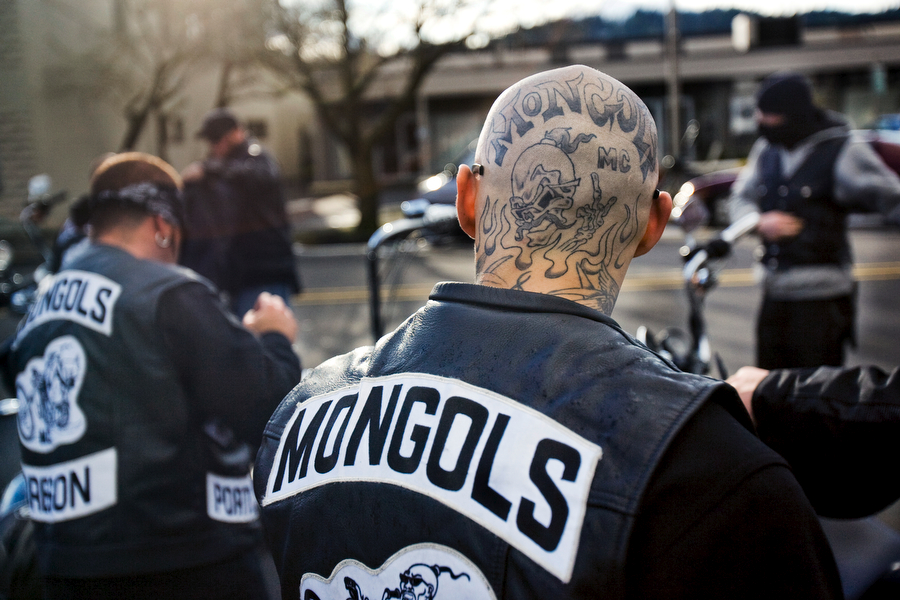Attorney: Government taking control of Mongols motorcycle club patches would be ‘death penalty’ for the group
Jurors, who have already determined the outlaw motorcycle club engaged in illegal activity, now tasked with deciding fate of the organizations trademark

By SEAN EMERY | [email protected] | Orange County RegisterPUBLISHED: January 8, 2019 at 5:27 pm | UPDATED: January 8, 2019 at 5:38 pm
Allowing the government to take control of the notorious Mongols motorcycle club’s prized patches would be a “death sentence” for the organization, an attorney for the outlaw club argued on Tuesday.
Jurors who last month found the outlaw motorcycle club guilty of racketeering returned to the federal courthouse in Santa Ana on Tuesday morning, as the focus of the trial shifted from talk of drug trafficking, vicious assaults and murder to testimony about trademarks and the importance of the patches that adorn the leather vests worn by Mongols members.
Unlike typical criminal racketeering cases, the defendant in the trial is solely the motorcycle club itself, not any specific members.
The unique attempt by federal prosecutors to take control of the club’s trademark — and therefore its patches and logo — would, if successful, set a precedent that could be used against other criminal organizations. As a result, U.S. District Judge David O. Carter, who is presiding over the trial, previously noted that the case will almost certainly make its way to the federal appeals court and likely the U.S. Supreme Court.
“It wasn’t about putting anybody in jail,” Attorney Joseph Yanny, who is representing the Mongols, said of the current trial. “Because the guilty have already been put in jail. Some of the innocent as well.”
“What the government is seeking here is effectively the death penalty (for the club),” Yanny added, a comment that drew a quick objection from prosecutors.
Assistant U.S. Attorney Steven Welk said taking the Mongols’ trademarks is “the only way to stop the endless cycle of crime that organizations like this perpetuate.”
“These men, fueled by rage and methamphetamine, empowered by these symbols they wear like armor, roamed the world looking for people to victimize,” Welk said.
The trial stems from Operation Black Rain, a multi-agency investigation that involved several law enforcement agents infiltrating the Mongols. A separate, earlier racketeering case resulted in 77 members of the Mongols pleading guilty.
During the first phase of the current trial, prosecutors outlined for jurors a variety of violent incidents, including the so-called River Run riot in Laughlin, Nev., in 2002 that left five bikers dead; a melee at the Morongo Casino in Cabazon near Palm Springs and attacks, some fatal, in bars or restaurants in Hollywood, Pasadena, Merced, La Mirada, Wilmington and Riverside.
Much of that violence was tied to a bloody, decades-old rivalry between the Mongols and the Hells Angels motorcycle club.
Despite claims by the Mongols leadership that the organization wasn’t responsible for crimes committed by individual members or in self-defense, jurors at the end of the trial’s first phase found that the club itself is a criminal organization that supported drug trafficking and encouraged vicious assaults and even murder.
Jurors are now tasked with deciding if there is a link between the government’s requested seizures and the crimes committed in the racketeering conspiracy.
Most notably, the government is seeking to take control of the patches that adorn the Mongols’ leather “cuts,” comprised of the club’s name at the top of the jacket, an illustration of a Genghis Khan-type character riding a motorcycle and wearing sunglasses in the center, and the name of the state where a member’s chapter is located at the bottom.
The trademark seizure would also cover a variety of other Mongols-tagged items including baseball caps, t-shirts, rings, belt buckles, motorcycle helmets, bandannas, mousepads and coffee mugs.
On Tuesday, Darrin Kozlowski, a now-retired U.S. Alcohol, Tobacco, Firearms and Explosives agent who infiltrated the Mongols while working undercover, described the control the organization’s top leaders exerted over Mongols’ merchandise, which the former officer said can only be purchased and worn by club members.
“A citizen couldn’t walk up and buy those things from the Mongols,” Kozlowski said. “They were only for sale to full patch members.”
Welk described the patches and jackets as the most prized possession of Mongols members, something they were expected to guard with their life. Along with the main club patch, members can earn patches for a variety of actions, including assaults and murders of rivals, or explicit sexual conquests, Kozlowski testified earlier in the trial.
Yanny denied that there was any link between the Mongols’ patches or other items and the crimes cited by prosecutors. The defense attorney said the “bad apples” from the club are gone, and the current leadership is trying to clean the organization up.
“You can’t just take property because you don’t like them or the Mongols are bad people,” Yanny said.
Formed in Montebello in the 1970s, the Mongols are now based in West Covina. Among those who testified in the current trial was former Minnesota governor and retired pro wrestler Jesse Ventura, who joined the Mongols in 1973, while still on active duty in the U.S. Navy.
Unlike the first phase of the trial, which lasted more than a month, testimony in the second phase began and ended on Tuesday. Jurors are expected to begin their deliberations on Wednesday.
Carter will ultimately make the final ruling on exactly what will be seized. If the government is allowed to seize the trademark, the judge will also decide what exactly it can do with it.

